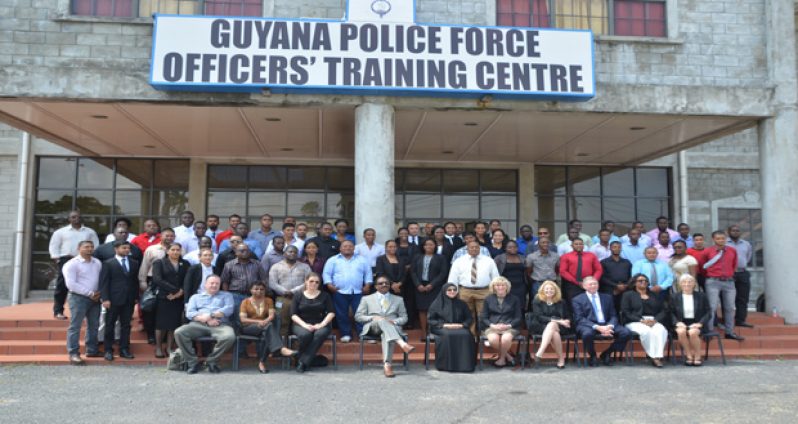THE Government of Canada is pumping Cdn$750,000 (equivalent of Gy$107,660,104) into boosting capacity of local lawmen to arrest the crime situation, better manage crime scenes, and conduct forensic analyses. This move comes amidst concerns about the escalation of violent crime locally.More than 75 members of the criminal justice system are currently being trained in Major Case Management, Crime Scene Management, and Forensic Video Analysis as the David Granger-led administration, with assistance from Canada, seeks to bring the crime rate down. The training forms part of a capacity-building project themed “Strengthening the Guyanese Criminal Justice System”, being implemented by the Justice Education Society (JES) of British Columbia under Canada’s Anti-Crime Capacity Building Programme(ACCBP)
Attorney General and Legal Affairs Minister, Basil Williams; Charge d’Affaires of the Canadian High Commission, Sharmini Poulin; JES International Programme Manager, Evelyn Neaman; and Director of Public Prosecutions, Bibi Shalimar Ali-Hack, on Friday visited the Police Training Centre in Georgetown, where the training is being conducted.
“This training comes at a very opportune time, when our government has undertaken to restore the rule of law; to deliver a justice system that is impartial, accessible and accountable; and to ensure that crime is solved more quickly and efficiently,” the Attorney General said as he addressed the police prosecutors, crime scene investigators, state prosecutors, magistrates, and forensic experts.
It will also help to build the country’s capacity in crime scene investigation, forensic training, and training of prosecutors, he said.
Singling out the Forensic Video Analysis aspect of the project, the Attorney General said it would assist investigators significantly at a time when technology is playing a leading role in crime scene investigation in the developed world.
He said government is pleased to engage Canada in a partnership that would help to strengthen the capacities of crime scene investigators and forensic experts to solve crimes and boost the abilities of police prosecutors and magistrates. “Through intense consultation with stakeholders and (culling of) views on crime prevention, criminal investigation and case management, our continuous cooperation has contributed greatly to the development of an even closer relationship between the criminal justice administrations of our two countries — Guyana and Canada,” Minister Williams added.
It is often said that economic development provides the basis for social stability, but according to the Attorney General, sustainable public peace based on law and order are inevitably needed to ensure the fruits of economic development.
“Together with this common objective, I am sure we can do much to help the government in giving the protection the people need, and in ensuring their safety and security.”
The Canadian Charge d’Affaires said the project was a symbolism of Canada’s commitment to promoting freedom, democracy, human rights and the rule of law by strengthening the professionalism and accountability of law enforcement agencies.
“Our capacity-building efforts in Guyana and elsewhere are helping criminal justice systems to be more responsive to the needs of citizens. For instance, we have also supported a successful JES programme in El Salvador, (and this) has resulted in tangible, positive results in terms of increased efficiency of criminal investigations, greater collaboration between institutions, and reduced impunity rates,” Poulin said.
Access to a competent and fair justice system is a fundamental human right, Poulin added, while noting that in an effective criminal justice system, all parties involved must have a common understanding on decisions pertaining to the management, policies and procedures throughout the entire system.
“For instance, if the police are going to focus more on the collection and recording of evidence, then the prosecutors need to know how to present evidence-based cases, and magistrates must know how to effectively review such cases. The work that JES is doing helps to promote these synergies,” she explained.
It was pointed out that the JES project complements work already being done locally to strengthen court procedure rules and improve access to, and efficiency of, the justice system.
But although JES continues to work in different corners of the world, its work does not follow a “one size fits all” model, Poulin emphasized, stating clearly that while the methodology is based on Canadian best practices, it is always modified and tailored to local and social conditions.
“Work is done in full collaboration with local partners from project inception to completion. This is why the support of our local partners: Ministry of Public Security, the Ministry of Legal Affairs, the Guyana Police Force, the Office of the DPP, and the Judiciary, is essential in order for the project to be successful.
“Thank you for your support and guidance from planning to implementation.”
The JES project will come to an end in May 2017, when more than 250 persons within the justice system are expected to have completed their training which commencing in August, 2015.



.jpg)









